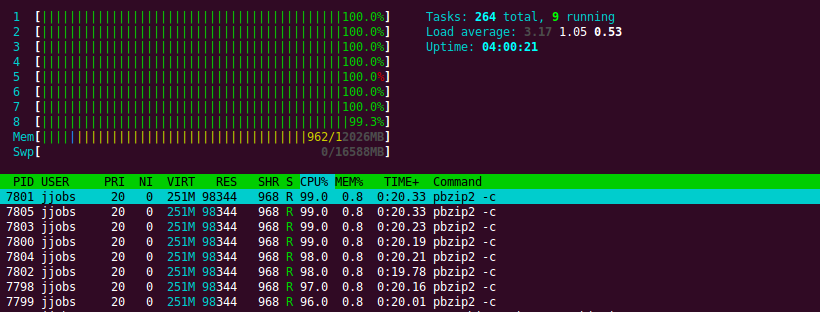Premise
Today I found myself in need of archiving some virtual machines, which is quite often rather large. The actual machine I was working on was a 4 core, 8 with HT, Xeon powerhouse and I was curious to see if there was any way to speed up compression times for this particular task.
Looking into things
Usually I always grab for my trusty old friend tar when creating archives and it does get the job done well. The thing about tar though, is that it is inherently single-threaded, so it doesn’t really matter how many CPU cores you throw at it.
After digging around a bit I found pbzip2. Description:
pbzip2 is a parallel implementation of the bzip2 block-sorting file compressor that uses pthreads and achieves near-linear speedup on SMP machines.
Sounds good right? I decided to try i out and measure the results. The size of the virtual machine was about 11G:
~$ du -hs * 11G WinXP_32Bit |
With just plain old tar it took about eight minutes:
~$ time tar zcvf winxp.tar.gz WinXP_32Bit real 8m18.583s user 6m47.089s sys 0m15.129s |
Not bad, but that is nothing compared to piping it through pbzip2:
~$ time tar -c WinXP_32Bit | pbzip2 -c > winxp.tar.bz2 real 4m54.942s user 38m22.452s sys 0m25.022s |
Screenshots of htop to show the difference in cpu core utilisation:
Both resulting archives were of equal size, so the immediate benefit is purely speed:
~$ du -hs * 11G WinXP_32Bit 6.2G winxp.tar.bz2 6.2G winxp.tar.gz |
For good measure, I also timed the decompression speeds. Though there was still a gain in speed, it was not quite as significant as with compression:
~$ time tar zxvf winxp.tar.gz real 5m8.636s user 1m20.061s sys 0m20.413s ~$ time pbzip2 -d winxp.tar.bz2 < real 4m32.329s user 13m15.814s sys 0m19.057s |
Some things might be said for a lot of other limiting factors such as disk read/write speed etc. Playing around with different settings of pbzip2 might also reveal greater performance boosts than this simple example, but by standard, it is now a welcome addition to my *nix toolkit.

